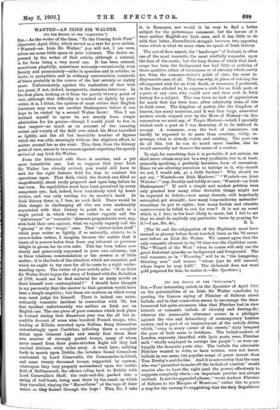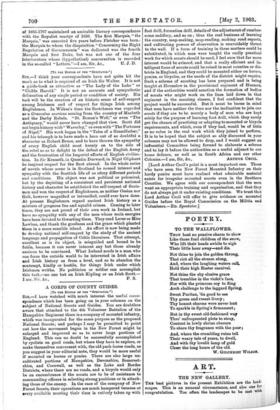[TO THE EDITOR OP THE "SPECTATOR-1 SIR,—Your interesting article in
the Spectator of April 18th on the potentialities of an Irish Sir Walter concludes by quoting the famous saying of Fletcher of Saltoun about ballads, and in that connection seems to encourage the time- honoured but quite erroneous idea that Fletcher had in view historic or romantic ballads of chivalry and derring-do ; whereas the memorable utterance occurs in a philippic against the vice and debauchery of contemporary London society, and is part of an impeachment of the unholy ditties which, "sung in every corner of the streets," daily tempted the poor of both sexes to lewdness. The ballad-makers of London, expressly identified with lyric poets, were, Fletcher said, "wholly employed to corrupt the people "; as were 'un- happily the dramatic poets also. The ballads the admirable Fletcher wanted to write, or have written, were not heroic ballads in our sense, but popular songs of purer morals than Tom Durfey's and the like. And it is noteworthy that the man who was "permitted to make all the ballads of a nation" would require also to have the right (and the power) effectively to suppress everybody else's,—an important proviso not always realised. Is not the appended phrase, " wrote Andrew Fletcher of Saltoun to the Marquis of Montrose," rather like to prove a trap for the unwary ?—suggesting that the fiery Republican
of 1685-1707 maintained an amicable literary correspondence with the Royalist martyr of 1650. The first Marquis, " the Marquis," was executed five years before Fletcher was born : the Marquis to whom the disquisition " Concerning the Right Regulation of Governments " was dedicated was the fourth Marquis and first Duke, but was not one of the four interlocutors whose (hypothetical) conversation is recorded in the so-called " Letters."—I am, Sir, &c., II. J. D.











































 Previous page
Previous page